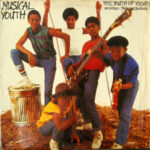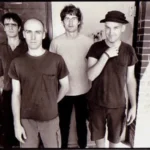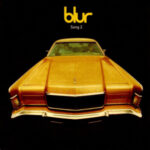In the late 1970s and throughout the 1980s, a musical revolution was brewing that would reshape the landscape of popular music. Among the myriad of genres emerging during this era, New Wave stood out as a dynamic and eclectic movement that blended various styles, subverting traditional expectations. In the midst of this sonic upheaval, one band boldly asserted its presence, defying conventions and pushing the boundaries of sound and social commentary. This band was Romeo Void.
Romeo Void emerged from the vibrant musical scene of San Francisco in the late 1970s. Formed in 1979, the band consisted of distinctive members, each contributing a unique element to their sound. Debora Iyall, with her evocative vocals and thought-provoking lyrics, became the face and voice of the band. Peter Woods brought the infectious guitar riffs that would define their sound, while Benjamin Bossi’s saxophone added a layer of sophistication and rebellion. Larry Carter on bass and Aaron Smith on drums formed the rhythm section that anchored their music with a pulsating beat.
The band’s moniker, derived from the Shakespearean phrase “Romeo, Romeo, wherefore art thou Romeo?” hinted at their intention to challenge norms and question societal expectations. From the outset, Romeo Void was destined to be more than just a musical entity; they were poised to be cultural provocateurs, pushing against the constraints of both musical and societal conventions.
Their debut album, “It’s a Condition” (1981), introduced audiences to the raw and unapologetic energy that would become Romeo Void’s signature. The album’s standout track, “Never Say Never,” propelled them into the spotlight with its infectious rhythm, Debora Iyall’s confrontational vocals, and the searing saxophone of Benjamin Bossi. The song’s lyrics, exploring themes of desire and societal norms, set the stage for the band’s reputation as lyrically daring and musically innovative.
The success of “Never Say Never” paved the way for their sophomore effort, “Benefactor” (1982). This album continued to showcase the band’s willingness to experiment with different sounds and themes. The track “A Girl in Trouble (Is a Temporary Thing)” addressed issues of sexuality and relationships, further establishing Romeo Void as a band unafraid to delve into the complexities of human experience. “Benefactor” affirmed their commitment to pushing the boundaries of New Wave, cementing their status as pioneers in the genre.
Debora Iyall’s lyrics became a defining element of Romeo Void’s identity. Her poetic and thought-provoking words tackled issues such as gender roles, desire, and societal expectations. In songs like “Myself to Myself” and “Aventures de Vide et de Vague,” Iyall’s introspective and eloquent lyrics showcased a depth and intelligence that set Romeo Void apart from their contemporaries.
However, it wasn’t just the lyrics that distinguished Romeo Void; it was the amalgamation of diverse musical elements. The incorporation of saxophone as a central instrument, thanks to Benjamin Bossi’s skillful playing, added a layer of sophistication and unpredictability to their sound. This unique sonic palette expanded the possibilities of New Wave, creating a distinct space for Romeo Void within the broader musical landscape.
Their third album, “Instincts” (1984), marked another evolution in the band’s sonic journey. The album featured tracks like “Talk Dirty (to Me),” which embraced a more polished and radio-friendly sound. While some critics viewed this shift as a departure from their earlier, edgier style, others recognized the band’s ability to adapt and experiment within the evolving music industry.
Despite their musical prowess and critical acclaim, Romeo Void faced challenges that were emblematic of the industry’s limitations at the time. Their genre-defying approach and willingness to explore complex themes sometimes made it difficult for them to fit neatly into commercial molds. The band’s unique sound, while earning them a devoted fanbase, also contributed to their relative underappreciation compared to more mainstream acts of the era.
Tragically, Romeo Void disbanded in 1985, leaving behind a musical legacy that would inspire future generations. Their influence can be heard in the music of alternative and indie artists who appreciate the band’s fearless approach to genre-blending and their unapologetic exploration of social and personal issues. While their time in the limelight was relatively brief, Romeo Void’s impact on the New Wave movement and the broader musical landscape is undeniable.
In the decades that followed, a renewed interest in Romeo Void’s discography emerged, leading to retrospectives and reevaluations of their contributions. The band’s influence can be seen not only in the music they created but also in the trail they blazed for artists who sought to challenge norms and push the boundaries of expression within the constraints of popular music.
In conclusion, Romeo Void stands as a testament to the transformative power of music. Their willingness to challenge conventions, both musically and lyrically, established them as pioneers in the New Wave movement. With Debora Iyall’s evocative vocals, Benjamin Bossi’s distinctive saxophone, and the band’s overall commitment to pushing boundaries, Romeo Void left an indelible mark on the 1980s music scene. Their legacy endures as a reminder of the importance of artistic fearlessness and a commitment to exploring the depths of human experience through the medium of sound.
This post has already been read 193 times!










